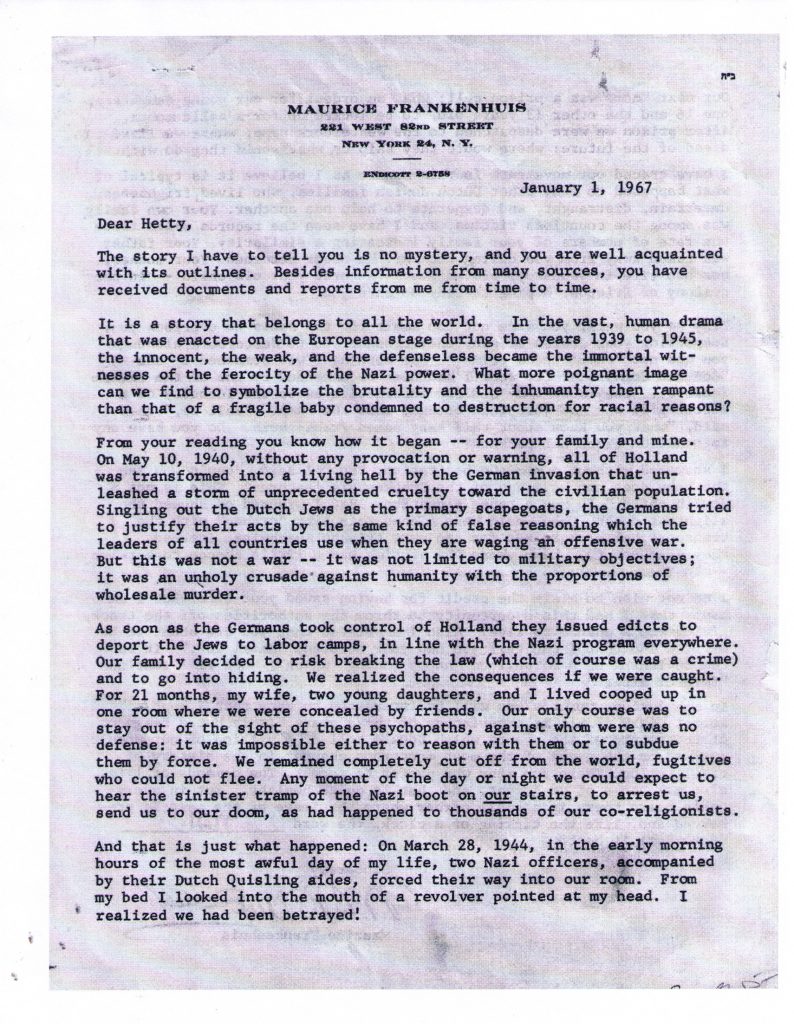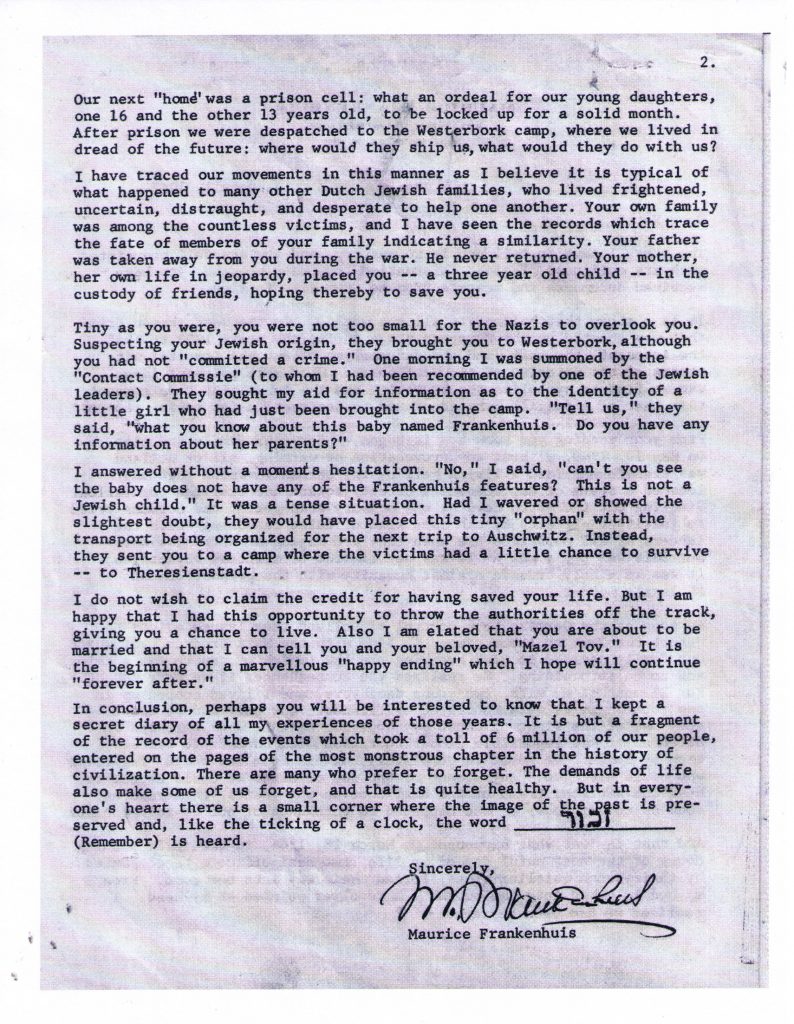Saving an Orphan from transport to Auschwitz
“He who saves a single life, is as if he saves an entire world”.
Mishnah Sanhedrin 4:9; Babylonian Talmud Tractate Sanhedrin 37a


MAURICE FRANKENHUIS
221 WEST 82ND STREET
NEW YORK 24, N. Y.
ENDICOTT 2-6758
January 1, 1967
Dear Hetty,
The story I have to tell you is no mystery, and you are well acquainted with its outlines. Besides information from many sources, you have received documents and reports from me from time to time.
It is a story that belongs to all the world. In the vast, human drama that was enacted on the European stage during the years 1939 to 1945, the innocent, the weak, and the defenseless became the immortal witnesses of the ferocity of the Nazi power. What more poignant image can we find to symbolize the brutality and the inhumanity then rampant than that of a fragile baby condemned to destruction for racial reasons?
From your reading you know how it began — for your family and mine. On May 10, 1940, without any provocation or warning, all of Holland was transformed into a living hell by the German invasion that unleashed a storm of unprecedented cruelty toward the civilian population.
Singling out the Dutch Jews as the primary scapegoats, the Germans tried to justify their acts by the same kind of false reasoning which the leaders of all countries use when they are waging an offensive war. But this was not a war — it was not limited to military objectives; it was an unholy crusade against humanity with the proportions of wholesale murder.
As soon as the Germans took control of Holland they issued edicts to deport the Jews to labor camps, in line with the Nazi program everywhere Our family decided to risk breaking the law (which of course was a crime) and to go into hiding. We realized the consequences if we were caught. For 21 months, my wife, two young daughters, and I lived cooped up in one room where we were concealed by friends. Our only course was to stay out of the sight of these psychopaths, against whom were was no defense: it was impossible either to reason with them or to subdue them by force. We remained completely cut off from the world, fugitives who could not flee. Any moment of the day or night we could expect to hear the sinister tramp of the Nazi boot on our stairs, to arrest us, send us to our doom, as had happened to thousands of our co-religionists.
And that is just what happened: On March 28, 1944, in the early morning hours of the most awful day of my life, two Nazi officers, accompanied by their Dutch Quisling aides, forced their way into our room. From my bed I looked into the mouth of a revolver pointed at my head. I realized we had been betrayed!
Our next “home” was a prison cell: what an ordeal for our young daughters, one 16 and the other 13 years old, to be locked up for a solid month. After prison we were despatched to the Westerbork camp, where we lived in dread of the future: where would they ship us, what would they do with us?
I have traced our movements in this manner as I believe it is typical of what happened to many other Dutch Jewish families, who lived frightened, uncertain, distraught, and desperate to help one another. Your own family was among the countless victims, and I have seen the records which trace the fate of members of your family indicating a similarity. Your father was taken away from you during the war. He never returned. Your mother, her own life in jeopardy, placed you — a three year old child — in the custody of friends, hoping thereby to save you.
Tiny as you were, you were not too small for the Nazis to overlook you. Suspecting your Jewish origin, they brought you to Westerbork, although you had not “committed a crime.” One morning I was summoned by the “Contact Commissie” (to whom I had been recommended by one of the Jewish leaders). They sought my aid for information as to the identity of a little girl who had just been brought into the camp. “Tell us,” they said, “what you know about this baby named Frankenhuis. Do you have any information about her parents?”
I answered without a moment’s hesitation. “No,” I said, “can’t you see the baby does not have any of the Frankenhuis features? This is not Jewish child.” It was a tense situation. Had I wavered or showed the slightest doubt, they would have placed this tiny “orphan” with the transport being organized for the next trip to Auschwitz. Instead, they sent you to a camp where the victims had a little chance to survive — to Theresienstadt.
I do not wish to claim the credit for having saved your life. But I am happy that I had this opportunity to throw the authorities off the Track, giving you a chance to live. Also I am elated that you are about to be married and that I can tell you and your beloved, “Mazel Tov”. It is the beginning of a marvelous “happy ending” which I hope will continue “forever after.”
In conclusion, perhaps you will be interested to know that I kept a secret diary of all my experiences of those years. It is but a fragment of the record of the events which took a toll of 6 million of our people, entered on the pages of the most monstrous chapter in the history of civilization. There are many who prefer to forget. The demands of life also make some of us forget, and that is quite healthy. But in everyone’s heart there is a small corner where the image of the past is preserved and, like the ticking of a clock, the word ???? (Remember) is heard.
Sincerely,
Maurice Frankenhuis